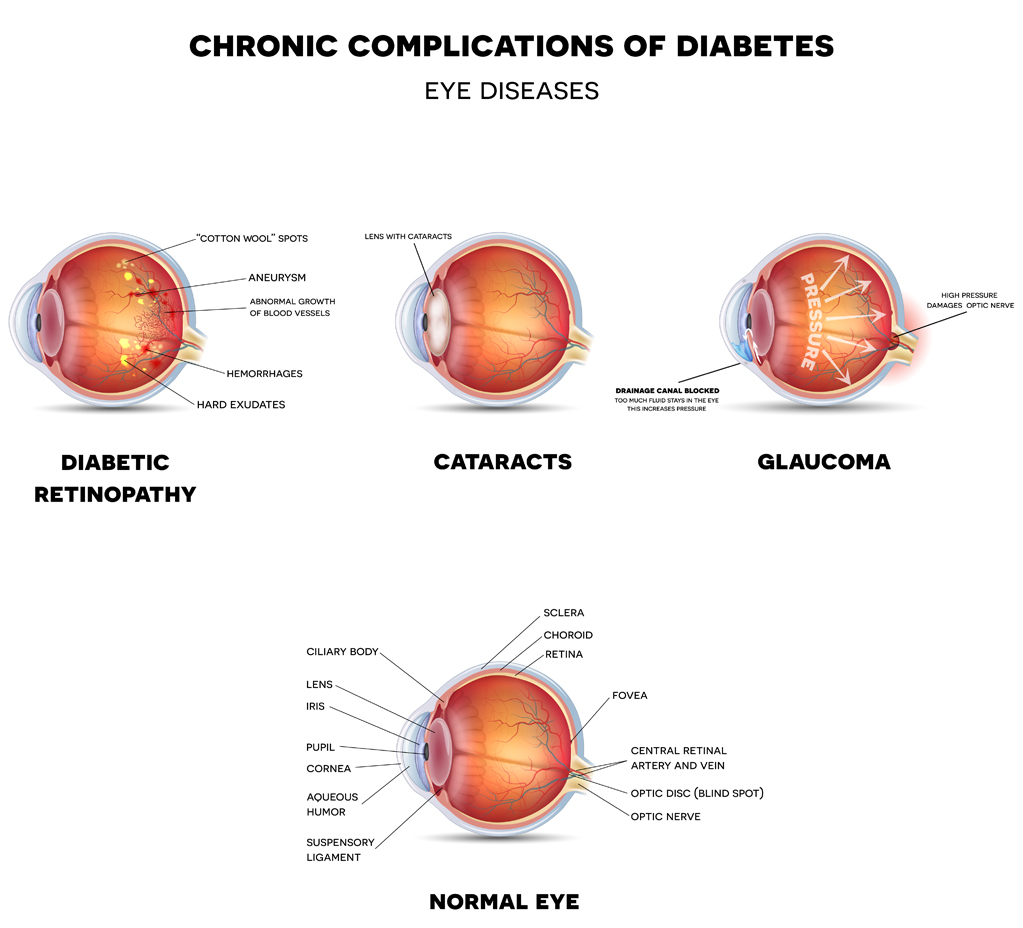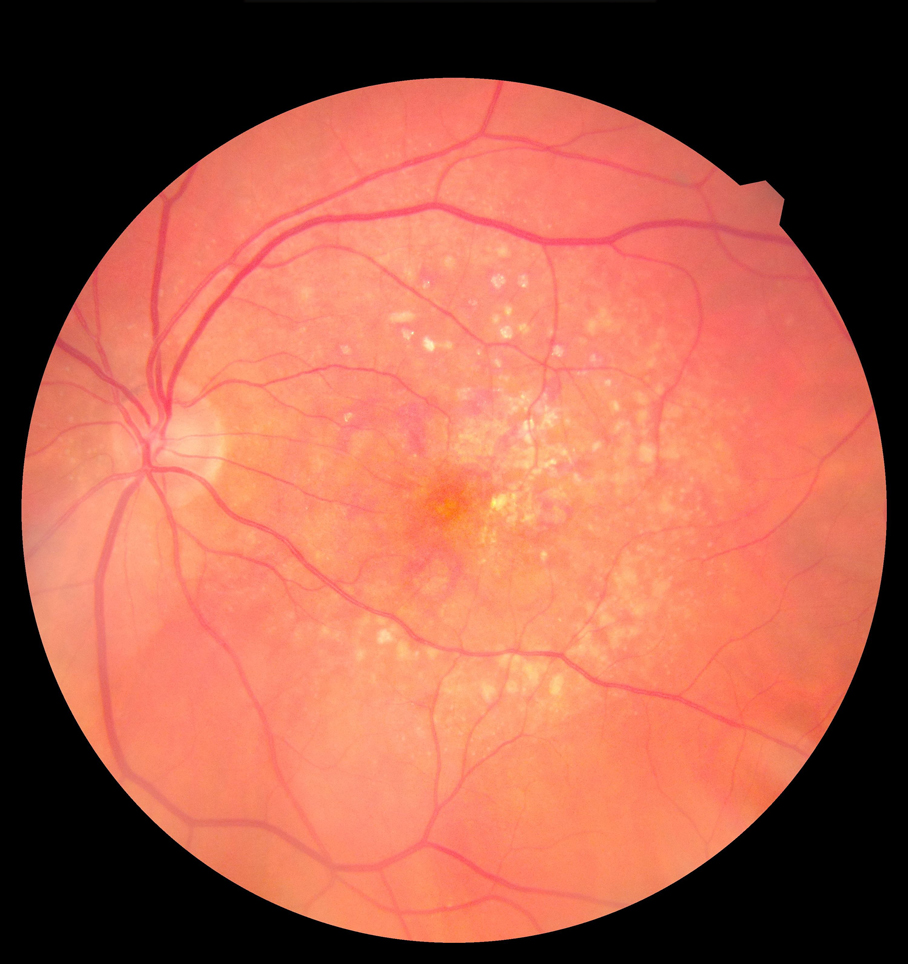Menu
Diabetic retinopathy is an ocular complication of diabetes. It affects about one half of the Americans diagnosed with diabetes and can lead to blindness if undetected or untreated. Because diabetic retinopathy can damage your sight without obvious symptoms, diabetics should have a dilated eye examination at least once a year.

Diabetes can cause damage to tiny blood vessels including those of the retina, the light-sensitive tissue at the back of the eye. While retinal blood vessels are being damaged, most people do not notice any changes in their eye or their vision. Sometimes, the blood vessels leak fluids onto the macula which is the portion of the retina responsible for seeing fine detail. When this happens, the fluid makes the macula swell, resulting in blurred vision. As the disease progresses, new blood vessels grow along the retina and in the vitreous gel of the eye. Without treatment, these blood vessels can swell, bleed and ultimately destroy the retina.
When laser surgery does not successfully lower eye pressure, or the pressure begins to rise again, the doctor may recommend conventional surgery.
A dilated eye examination allows your doctor to look at the back of the eye and check your retina for early signs of the disease, such as: changes in blood vessels; retinal swelling, such as macular edema; pale, fatty deposits on the retina; or damaged nerve tissue.
There are two common treatments which are very effective in reducing vision loss from this disease. In fact, even people with advanced retinopathy have a 90 percent chance of keeping their vision when they get treatment before the retina is severely damaged. It is important to note that although treatment is very successful, there is no cure for diabetic retinopathy.

Laser Photocoagulation is performed in a doctor’s office or eye clinic. Before the surgery, your ophthalmologist will dilate your pupil and apply numbing drops. The doctor also may numb the area behind the eye to prevent any discomfort. The lights will be dim. As you sit facing the laser, your doctor will hold a special lens to your eye. During the procedure, you may see flashes of light. For the rest of the day, your vision will probably be a little blurry.
Vitrectomy is an alternative to laser surgery, and is performed if you have a lot of blood in the vitreous. It involves removing the cloudy vitreous and replacing it with a salt solution. Because the vitreous is mostly water, you will notice no change between the salt solution and the normal vitreous. Early vitrectomy is especially effective in people with insulin-dependent diabetes, who may be at greater risk of blindness from a hemorrhage into the eye. Vitrectomy is often done under local anesthesia. This means that you will be awake during the operation. The doctor makes a tiny incision in the sclera, or white of the eye. Next, a small instrument is placed into the eye. It removes the vitreous and inserts the salt solution into the eye.
Diabetes is a serious threat to sight and should be taken very seriously. Early detection and treatment is critical to ocular health, but good management of diabetes is the best prevention. Researchers have found that diabetic patients who are able to maintain appropriate blood sugar levels have fewer eye problems than those with poor control. Diet and exercise also play important roles in the overall health of those with diabetes. Call Florida Eye Associates at 321-727-2020 if you have recently been diagnosed as diabetic or pre-diabetic, or would like to schedule a dilated eye examination.
For more than 54 years, Florida Eye Associates has been treating glaucoma and other diseases of the eyes. Call 321-727-2020 to schedule an evaluation and to learn what treatment options might be best for you.





















Our main office 502 East New Haven ave in downtown Melbourne is temporarily closed due to renovations. Our other four locations and ambulatory surgery center are open. Saturday appointments are at our 509 east new haven office in downtown Melbourne. If you have an appointment at this location our staff will contact you to reschedule you as soon as possible.
Our phone number remains 321-727-2020 but with high call volume.
We apologize for the inconvenience!
161 Malabar Road NE
Palm Bay, Florida 32907
Phone: (321) 727-2020
Fax: (321) 726-4061
Hours:
8:00 am – 4:30 pm – Monday – Friday
5510 Murrell Road
Melbourne, Florida 32940
Phone: (321) 727-2020
Fax: (321) 726-4061
Hours:
8:00 am – 4:30 pm – Monday – Friday
2003 N. Atlantic Avenue
Cocoa Beach, Florida 32931
Phone: (321) 727-2020
Fax: (321) 726-4061
Hours:
8:00 am – 4:30 pm – Monday – Friday
509 East New Haven Avenue
Melbourne, Florida 32901
Phone: (321) 727-2020
Fax: (321) 726-4061
Hours:
8:00 am – 4:30 pm – Monday – Friday
8:00 am – 11:00 am – Saturday
719 E. New Haven Ave.
Melbourne, Florida 32901
Phone: 321-984-4405
Open:
Monday – Friday
© 2023 Florida Eye Associates. Privacy Policy